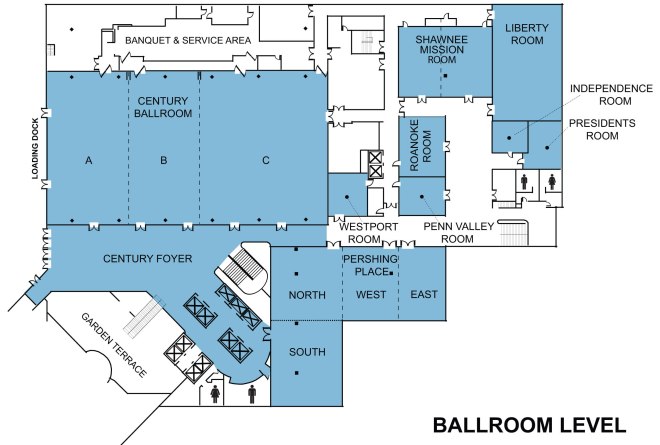Six more fantastic sessions to close out MAC 2014, The Syncopations of History::
8:30-10:00AM Concurrent Sessions
- The DAO of Processing: Applying MPLP to Electronic Records Workflows. Electronic records: do they require artisanal or mass processing? Brad Houston (University of Wisconsin-Milwaukee) and panelists Edward Benoit III (University of Wisconsin-Milwaukee), Brian Dietz (North Carolina State University), Jason Evans Groth (North Carolina State University), and Daniel W. Noonan (The Ohio State University) examine the ways various institutions are collecting, processing, and preserving electronic records according to the principles of More Product, Less Process while still adhering to appropriate digital preservation standards.
[Pershing Place East & West, Ballroom (3rd) Floor, Westin at Crown Center] - Show Me Out of the Closet: Approaches to Preserving Missouri’s LGBT History. Efforts to capture and preserve the history of the Lesbian, Gay, Bisexual, and Transgender population in Missouri’s three largest cities (St. Louis, Kansas City, and Springfield) have yielded not only a wide-ranging trove of remarkable historic value but also distinct approaches to building the archival collections. Join Stuart Hinds (University of Missouri-Kansas City) and panelists Anne M. Baker (Missouri State University) and Steven L. Brawley (St. Louis LGBT History Project) as they discuss their techniques for reaching LGBT communities, what they’ve been able to collect, and how they make it available to their users.
[Pershing Place South, Ballroom (3rd) Floor, Westin at Crown Center] - Spinning the Classics: Using Archival Materials to Bridge the Gap from the Past to the Present. Connecting the old with today’s interests is not for the passive. Join Kathy Gaynor (Webster University) and panelists Carol Street (Ball State University) and Sara Harrington (Ohio University) as they show how archival material can have relevance to our present-day lives and can spur discussion of current society and values. Come learn how classroom activities such as using historical architectural drawings to create physical models with cutting-edge 3-D printing technology, discussing changing social mores through an examination of student handbooks, and composing contemporary alma maters inspired by the existing institutional anthem can all bridge the past-present gap.
[Pershing Place North, Ballroom (3rd) Floor, Westin at Crown Center]
10:30AM-12:00PM Concurrent Sessions
- “Don’t Knock the Rock”: Making Popular Music Collections a Part of Your Archives. Documenting local and regional popular music scenes is not an easy task. Come hear Scott Schwartz (Sousa Archives and Center for American Music) and panelists Heather Fox (University of Louisville), Rory Grennan (Sousa Archives and Center for American Music), Gino Pasi (Wright State University), Elizabeth E. Reilly (University of Louisville), and Jennie Thomas (Rock and Roll Hall of Fame) explain some of the difficulties is collecting this sort of material. More importantly, however, come and hear how to make this task less daunting. Among the topics to be addressed are donor relations, community outreach, accessibility, documentation strategies, and making the case for collecting these materials to administration, peers, and library friends groups. The session will focus on the music scenes in Champaign, Illinois, Dayton and Cleveland, Ohio, and Louisville, Kentucky.
[Pershing East & West, Ballroom (3rd) Floor, Westin at Crown Center] - Syncopation of Social Media: New Ways of Using, Improving, and Evaluating Social Media. The title of this session says it all! Dana Gerber (University of Wisconsin-Madison) and panelists Laura Farley (Wisconsin Historical Society), Danielle Spalenka (Northern Illinois University), and Eric Willey (Filson Historical Society) will address three strategies to improve your institution’s involvement with social media: 1) targeting existing subgroups of overall users, 2) reaching out to new users, and 3) using statistical tracking in social media platforms to evaluate the success of the social media programs. Whether or not social media is already a part of how your organization relates to its users, this is the session to help you with next steps.
[Pershing Place North, Ballroom (3rd) Floor, Westin at Crown Center] - Working in Harmony: Conducting Your Role as a Contract Archivist. What are the challenges of the contract archivist? How does one successfully keep all the duties and expectations of a job in order? Join Troy Eller English (Wayne State University) and panelists Rebecca Bizonet (The Henry Ford), Andrea Gietzen (General Motors), and Alexandra A. A. Orchard (Wayne State University) as they look at 1) planning and prioritizing work, 2) negotiating relationships with coworkers, funders, donors, and the materials, 3) engaging within the workplace and the profession, and 4) communicating roles and engaging and managing the expectations of funders.
[Pershing Place South, Ballroom (3rd) Floor, Westin at Crown Center]
More information is available in the conference program (pdf) or at mac2014.sched.org

